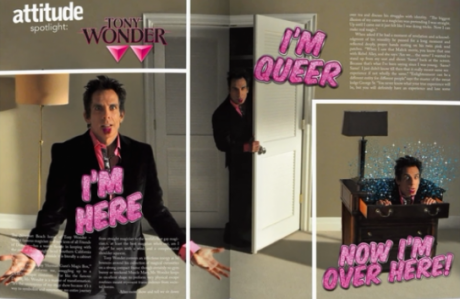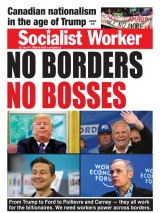Features
You are here
'I'm here! I'm queer! Now I'm over here!'

July 6, 2013
It has become all too common for mainstream commentators to argue that if only more high-profile figures were to come out of the closet then the problems that LGBT people face would be solved. If more CEOs, politicians, and athletes—ones that homophobic people particularly respect—were to identify as queer, what choice would straight folks have but to come to terms with LGBT people in general?
What underlies this emerging consensus is the belief that the oppression of LGBT people is caused solely by the irrational prejudices of the working class, which can be solved by “opening their eyes” with safe, acceptable examples of queerness. The flip side of this approach is to agree that LGBT oppression can be solved by "opening eyes", but in place of “acceptable” queerness (what some theorists call “homonormativity”) the goal instead is to confront straight people with the most radical and subversive examples of queerness that will, according to this view, shake them out of their prejudicial stupor.
In either approach, the oppression of LGBT people is seen as an incidental feature of contemporary capitalist society, a personal prejudice that just happens to have lingered past its historical expiration date, and one, consequently, that can be decisively fought with personal lifestyle choices and queers in high places. What gets lost in this perspective is the way that capitalism depends on the privatized, heterosexual family for the reproduction of its next generation of workers, and is thus, in its regular functioning, the essential precondition for the reproduction of heterosexist norms and ideas.
In the newest season of Arrested Development, Tony Wonder (Ben Stiller), who has long been a rival magician to G.O.B. (Will Arnett), decides to “go gay” in order to revitalize his career and take advantage of previously untapped markets. As he reveals to G.O.B., he's been “making a fortune with that gay magician act.” In a hilarious homage to the well-known slogan popularized by Queer Nation—"We're here! We're queer! Get used to it!"—the slogan for Tony Wonder's new act is "I'm here! I'm queer! Now I'm over here!"
And despite having just ruined a perfectly good plot line, isn't that precisely where such individualist solutions leave us? If our belief is that coming out of the closet is the political act itself, then we're left with no sense of where to go once we're out, and we tend to become implicated in an extremely problematic discourse of “outing” celebrities who we think will be good to have in our movement. Like Tony Wonder, we are destined to move from side to side without any resolution.
An athlete like Jason Collins, the 34-year-old NBA veteran who came out in late April, is undoubtedly a courageous individual, and by doing what he did he makes coming out a bit easier for everyone. But that's precisely how best to think about people like Collins coming out: just like winning any reform that makes life a bit better, high profile individuals coming out provides greater breathing room for others but does not end the basis of their oppression. When the Jason Collins' or the Brittney Griners of the world declare that they are gay, lesbian, bisexual or trans*, they build the confidence of those individuals—particularly LGBT youth—that need to be organizing, but that still too often live in conditions of fear, violence, and self-hatred. However, these same people need to be organizing on a class basis and across racial, gender or any other lines in order to overcome the oppressions created, maintained and the divisions constructed by the ruling class.
We need all of the confidence that we can get but more than anything we need that confidence channelled into a real, fighting movement for LGBT liberation. Without that, we're stuck with Tony Wonder politics—waiting desperately for the next person who will come out and surprise us all.
Section:










